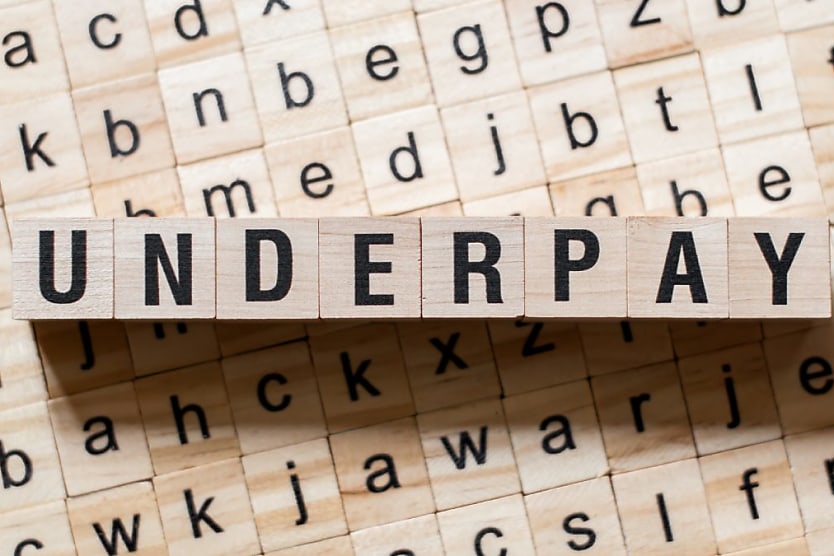Underpayment of workers: What you can do about it
SHARE THIS ARTICLE

The underpayment of employees is a persistent issue that affects workers across various industries and countries.
Many workers are entitled to be paid a minimum wage and other minimum entitlements as outlined in modern awards or enterprise agreements. However, some employers fail to meet these obligations, resulting in underpayment of wages and other forms of exploitation.
As an employer, ensure that your employees are compensated correctly and fairly. Failure to do so can lead to legal issues, damage to your reputation, and a loss of trust among your staff.
In this article, we discuss what you need to know about the underpayment of employees and what to do if it happens in your workplace.
What does underpayment mean?
Underpayment refers to a situation where an employee is not paid the minimum wage or the agreed-upon salary for the work they perform. It can also occur when employees are not paid for overtime, public holidays, or other entitlements.
What to do if an employee has been underpaid?
As an employee, if you suspect that you are being underpaid, there are several steps you can take to address this issue:
- Check your employment contract, modern award, or enterprise agreement to ensure that you are being paid the correct rate for your role and level of experience.
- Keep track of the hours you work and the pay you receive to ensure that you are being paid correctly. If you notice any discrepancies, bring them to your employer’s attention.
- Speak to your employer or HR representative about your concerns. Provide evidence to support your claim, such as your payslips or records of your hours worked.
- If your employer is unable or unwilling to rectify the underpayment issue, seek advice from the Fair Work Ombudsman or a qualified employment lawyer. They can assist you in resolving the issue and recovering any money owed.
- If you are concerned about potential retaliation from your employer, it is important to document all communications and seek advice from a trusted source before taking any action.
Remember, as an employee, you are entitled to be paid fairly and correctly for the work you do. Don’t be afraid to speak up if you suspect that you’re being underpaid. By taking action to address this issue, you are not only standing up for your rights but also helping to create a fair and just workplace for all employees.
On the other hand, if you are an employer or HR representative, this is how you can help an underpaid employee:
- Listen to the employee’s concerns and take their claim seriously. It is important to show empathy and understanding and to reassure them that you will investigate their claim.
- Check the employee’s pay records to determine if they have been underpaid. This may involve reviewing their employment contract, modern award, or enterprise agreement to ensure that they have been paid the correct rate for their role and level of experience.
- If you discover that the employee has been underpaid, rectify the issue as soon as possible. This may involve paying the employee any money owed, adjusting their pay rate for future pay periods, or providing them with back pay.
- Communicate clearly and openly with the employee throughout the process. Keep them informed of any actions you are taking to rectify the issue and provide them with regular updates.
- Take steps to ensure that the underpayment issue does not occur again in the future. This may involve reviewing your payroll processes, providing additional training to your staff, or seeking advice from the Fair Work Ombudsman or a qualified employment lawyer.
It’s your responsibility to ensure that your employees are paid fairly and correctly for the work they do. By taking proactive steps to address underpayment issues, you’re not only fulfilling your legal obligations but also promoting a fair and just workplace culture.
Can you sue a company if they underpay you?
Employees can sue a company if they have been underpaid because this is a breach of employment laws or contracts. The employee may seek to recover the amount owed, as well as any additional damages such as interest and legal fees.
To avoid legal action, the company must resolve any underpayment issues as soon as possible and take steps to ensure they do not happen again. This may involve seeking advice from a qualified employment lawyer or HR consultant.
How long does an employer have to correct an underpayment in Australia?
Employers have an obligation to rectify underpayment issues as soon as possible. The Fair Work Ombudsman recommends that employers rectify underpayment issues within 30 days of becoming aware. However, there is no specific time limit for rectifying underpayment issues under Australian law.
The length of time an employer has to rectify an underpayment depends on the circumstances of the case, and employees need to seek legal advice to understand their rights and the time frame for taking legal action.
If an employee makes a complaint to the Fair Work Ombudsman, the company may be subject to an investigation or legal action if the underpayment issue is not rectified within a reasonable time frame. They should take all steps necessary to avoid legal action and damage to their company’s reputation.
Conclusion
Underpayment of employees is a serious issue that can have legal, financial, and reputational consequences for employers.
If an employee has been underpaid, it’s crucial to make up for the error as quickly as you can and take precautions to prevent it from happening again. If you have doubts and uncertainties about the situation, call a certified HR expert or employment lawyer to help you.
Remember, fair and correct payment of employees is essential for a happy and productive workplace.
